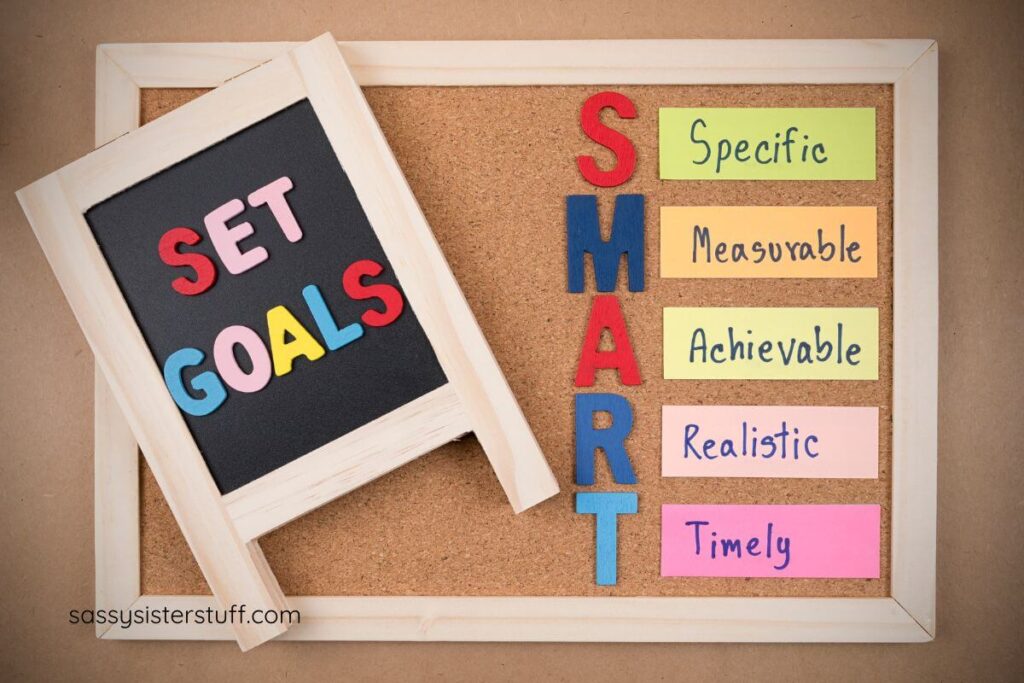How to Do a Life Audit for Personal Growth & Lasting Happiness
Midlife and the years leading into retirement offer a powerful window of opportunity — a chance to reflect, reset, and realign with what really matters. In other words, it’s a perfect time to do a life audit!
Whether you’re feeling stuck, seeking more purpose, or simply craving clarity, a life audit can be a transformative step in your personal growth journey.
It’s not about judging the past — it’s about shaping a future that feels fulfilling, intentional, and joyfully your own.

In this article, you’ll learn how to do a life audit that will help you gain insight, take inspired action, and create the kind of life that feels like you again — happier, freer, and more in control.
What is a Life Audit?
I first came across the term life audit while reading an article about personal growth. Naturally, I had to dig deeper — and what I discovered was a powerful tool for reflection and renewal.
Definition: A life audit is a thoughtful and intentional review of your life — your goals, values, habits, and overall happiness. It helps you realign with what truly matters so you can live more authentically and intentionally.
Importance: Doing a life audit, especially in midlife, can lead to powerful insights. It allows you to pause, reflect, and make meaningful shifts that better align with the woman you are today.
Timing: There’s no perfect moment for a life audit, but midlife often sparks the desire to reassess. As your priorities and perspectives evolve, it’s the ideal time to check in with yourself.
Mindset: Come into this process with curiosity, not judgment. A life audit isn’t about grading yourself — it’s about rediscovering what lights you up and what no longer serves you.
Outcome: The goal is clarity. A life audit helps you see what’s working, what’s not, and what changes might bring you more joy, fulfillment, and peace.
Understanding what a life audit is lays the foundation for a truly empowering self-growth journey. With this awareness, you’ll be ready to dive into the next steps — and start designing a life that feels just right for you.

Prepare Yourself for a Successful Life Audit
Before you begin digging into your life audit, it helps to create an environment — and a mindset — that supports reflection and clarity. These small prep steps can make a big difference in how meaningful (and even enjoyable!) this process feels. Let’s get started!
Set the Right Environment
Choose a quiet, comfortable space where you can be alone with your thoughts. Light a candle, brew a cup of tea or coffee, and put on soft music if it helps you relax.
This is your time, so make it feel special and calming. Whether it’s your favorite chair, a sunny porch, or even your bed with cozy blankets, find a spot where you can settle in and focus without interruptions.
Gather What You’ll Need
Before you get started, collect any tools that will help you stay organized and inspired. A journal or notebook, colorful pens or highlighters, sticky notes, or a printed worksheet can be helpful.
Prefer digital? Open up a Google Doc or a notes app. The goal is to have everything ready so you’re not hunting for supplies once you’re in the flow. You might also want to grab a few inspiring quotes or affirmations to keep nearby as encouragement.
These preparatory steps set me up for a purposeful journey of self-discovery and self-exploration.
Assess Each Area of Your Life
To create meaningful and lasting change, it helps to break your life down into categories. Looking at each area individually gives you a clearer sense of what’s working — and what’s not.
Here are a few key areas to reflect on:
- Career: Are you feeling fulfilled and motivated in your work? Think about your passion for what you do, opportunities for growth, and whether your job aligns with your personal values.
- Health: Consider your physical, mental, and emotional well-being. Is your current lifestyle supporting the kind of healthy, vibrant life you want to live?
- Relationships: Take stock of your personal and professional relationships. Are they supportive, energizing, and meaningful? Or are there areas that feel strained or draining?
- Leisure: How are you spending your free time? Are you doing things that bring you joy, help you relax, and add balance to your life?
- Finances: Look at your financial habits and situation. Do your spending and saving habits support your goals and give you peace of mind?
Reflecting on each area helps you see the bigger picture. It gives you a roadmap for where you want to go — and the clarity to take that first step.
So, are you ready to get started? Let’s do this!

Reflect on Your Values
When I did my first life audit, this step surprised me the most. I realized I was living by routines and expectations — but not necessarily by my own values. It took sitting quietly with a glass of unsweetened iced tea and a blank journal page to ask myself:
What actually matters to me now, in this chapter of life?
Our values can shift as we grow. What mattered in your 30s might not reflect who you are in your 50s or beyond. Take a moment to list 5–10 values you hold dear—like compassion, optimisim, freedom, creativity, or peace. Then ask:
- Am I honoring these values in my daily life?
- Which values are being neglected, and why?
- What small changes could realign me with what matters most?
In my case, I realized “curiosity” was a core value that had been buried under stress and obligations. Once I acknowledged it, I started exploring new hobbies and learning opportunities — just for fun.
If you need help identifying your values, try using a free values list like this one from Brené Brown’s Dare to Lead. Choose the ones that feel like truth, not pressure.
Once you’ve gone through this step, make a point to revisit it regularly. Staying connected to your values is key to living your most authentic life.
Quick Values Prompts
- List your top 5–10 values.
- Are these reflected in how you spend your time and energy?
- Which value feels most neglected right now—and why?
- What’s one small shift that could bring you back into alignment?
- Revisit this task freqently.

Evaluate Your Relationships
This part of the life audit can feel emotional — but it’s also incredibly freeing. When I first took stock of my relationships, I realized I’d been holding on to some connections out of habit, not health. And worse, I had neglected others that truly brought me joy.
Ask yourself:
- Who energizes me… and who drains me?
- Do I feel seen, supported, and respected in my closest relationships?
- Am I showing up fully and lovingly for the people I care about most?
Relationships should align with your values and bring you peace—not guilt, dread, or exhaustion. That doesn’t mean cutting people off without thought, but it does mean being honest about what you need.
In my own life, I’ve had to redefine boundaries with certain friends and even close family members. It wasn’t easy — but it gave me space to deepen the connections that do nourish me.
Start small: Is there a heartfelt conversation you’ve been avoiding? A boundary you need to gently change with a friend who has become toxic? A neglected relationship worth rekindling?
Healthy, fulfilling relationships are essential to your well-being — and they deserve intentional attention during your life audit.
Quick Relationship Prompts
- Who energizes me, and who drains me?
- Am I prioritizing the people who bring me peace and joy?
- Is there a conversation I’ve been avoiding that could bring healing or clarity to a toxic relationship?
- What boundaries might protect my emotional well-being?
- Which relationship deserves more of my time and love?
Learning how to do a life audit enchanced my personal growth and development journey. I discovered the true meaning of LIVING my best life.
Consider Your Health & Well-Being
At this stage in life, our health deserves more attention — not out of fear, but out of love for the life we still want to live.
Often, I’ve been guilty of poor nutrition and a lack of regular exercise — not because I didn’t know what was best for me, but because my life felt like it was spinning out of control. I’ve worked very hard on taking back control and creating a healthier lifestyle, one small step at a time.
I remember a season when I felt constantly tired, achy, and disconnected from my body. But when I paused to really assess my daily habits, I realized how often I had put myself last. That pause was the beginning of real change.
A life audit is the perfect moment to ask: How is my body feeling? How is my mind?
Consider these areas:
- Sleep: Are you getting enough rest to feel truly restored?
- Nutrition: Is your food fueling you or draining you?
- Movement: Are you staying active in ways that feel joyful — not punishing?
- Stress: Are you carrying more than you need to?
- Self-care: When was the last time you did something just for you?
You don’t need a total life overhaul. Often, small consistent changes — like daily stretching, walking outside, or drinking more water — can have a powerful ripple effect.
I’ve learned to treat well-being not as a to-do list, but as a kind of gentle stewardship of the life I still want to enjoy. Start where you are — and be kind to yourself in the process.
Quick Health & Well-Being Prompts
- What is one area of my health I’ve been avoiding — but need to face?
- Am I sleeping well and waking up refreshed?
- Do I nourish my body with foods that give me energy?
- What’s one small habit I can change this week to feel better in my body or mind?
- When was the last time I did something that made me feel alive?

Set Your Goals
I’ll be honest — after I retired, the idea of “setting goals” felt kind of irrelevant. I wasn’t chasing promotions or juggling packed calendars anymore. But over time, I realized that goals don’t have to be about productivity — they can be about purpose, peace, and passion.
Maybe your goal is to walk more, take a painting class, finally declutter the guest room, or spend more time with your grandkids. Maybe it’s to read 12 books in a year. Or maybe it’s to slow down and intentionally build more breathing room into your days.
A life audit invites you to ask:
- What do I want more of in my life right now?
- What have I always dreamed of doing — but never made time for?
- Where do I want to grow, even just a little?
Set one or two small, meaningful goals that align with your values and well-being — not someone else’s definition of success. And remember, progress over perfection.
For me, one of the goals I set recently was to spend intentional time outside every day — even if it’s just a short walk or sitting on the porch with my iced tea. It’s a simple goal, but it’s shifted my energy and mindset in such a positive way.
Write your goals down, keep them visible, and check in on them often. You may be surprised how much joy even a small shift can bring.
Quick Goal Setting Prompts
- What would make me feel more joyful, peaceful, or connected this month?
- What’s one small goal I could set that aligns with who I am now?
- Am I setting this goal for me, or to meet someone else’s expectations?
- What’s one tiny step I can take today to move forward?
- How can I celebrate progress — not just final results?

Create an Action Plan
Now that you’ve reflected on the key areas of your life, it’s time to turn insight into action. A life audit is only helpful if it leads to real change — and that starts with a clear, doable plan.
Look at your notes and identify 1–2 small steps you can take in each area. These don’t have to be big, dramatic shifts. In fact, small, consistent changes are often the most powerful. Whether it’s setting a boundary, scheduling a health check-up, joining a new group, or updating your resume — start where you are.
Give yourself realistic timelines. Build in flexibility and celebrate progress, not perfection. The goal isn’t to overhaul your life overnight — it’s to move forward with purpose and intention.
Quick Planning Prompts
- Choose one priority area from your audit.
- What’s one step you can take this week to improve it?
- What’s one longer-term goal you want to work toward this season?
Revisit Your Life Audit Regularly
Life isn’t static — and your goals, needs, and circumstances will shift over time. That’s why it’s important to revisit your life audit on a regular basis. Think of it as a living document, not a one-and-done project.
Set a reminder to check in with yourself every few months. What’s working? What’s changed? Where are you growing, and where are you feeling stuck?
This kind of intentional reflection helps you stay aligned with your values and make adjustments before burnout, frustration, or regret take over. It’s not about being perfect — it’s about staying connected to the life you truly want to live.
Quick Check-in Prompts
- When will you schedule your next life audit check-in?
- What changes have you noticed since your last reflection?
- Are your current actions still aligned with your values and goals?

Conclusion: How to Do a Life Audit
A comprehensive life audit isn’t something you rush through in one sitting. It’s a thoughtful process that deserves time, patience, and gentle reflection. In fact, I review mine at least once a week before I go to bed, just to feel confident in my life choices.
Remember — this isn’t about adding stress or self-judgment to your life. It’s about gaining clarity and creating a life that truly aligns with who you are today.
As we move into our senior years, it’s especially important to revisit our goals, our plans for retirement, and the kind of life we want moving forward. This is our chance to design our golden years with intention — rooted in our individual values, passions, and deepest desires.
Wishing you clarity, courage, and joy as you begin your own life audit journey! Remember, keep your life audits flexible, but intentional!
Ready for more inspiration?
Explore these personal growth and midlife transformation articles to support your next chapter.
- Personal Growth for Women over 50: Unleash Your Potential
- Your Ultimate Guide to a Joyful Midlife Reinvention
- Understanding and Surviving a Woman’s Midlife Crisis
Love to ALL! ~ Susan







